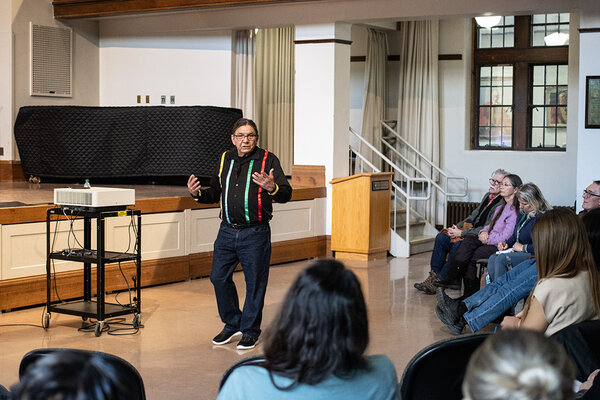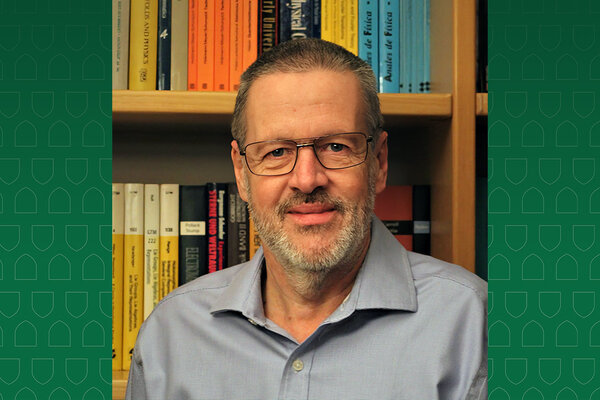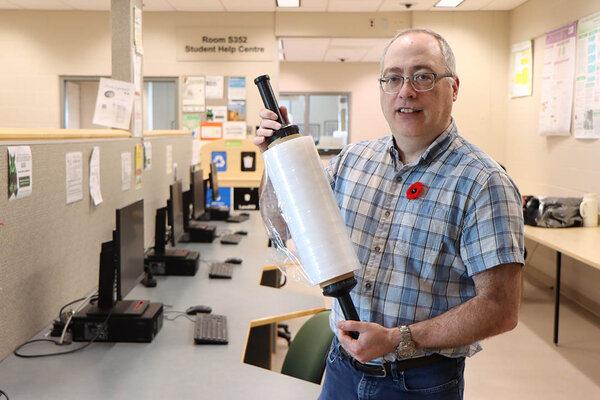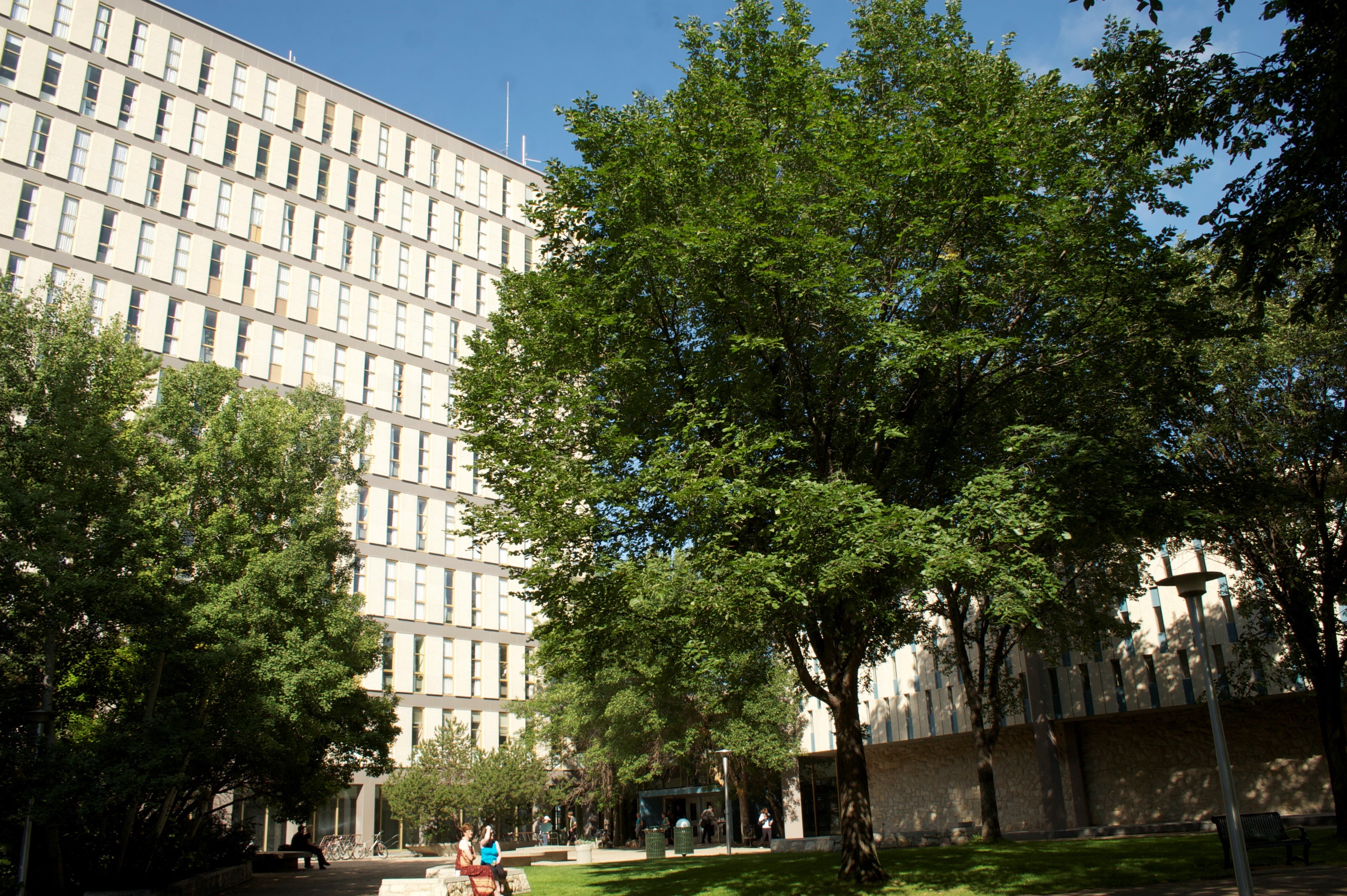
Five instructors honoured with College of Arts and Science Teaching Awards
Dr. Jorden Cummings, Dr. Kyle McLeister, Dr. Marla Mickleborough, Dr. Christopher Phenix and Dr. Ulrich Teucher are award recipients
By Shannon Boklaschuk
The College of Arts and Science at the University of Saskatchewan (USask) is celebrating five outstanding instructors with 2020-21 teaching awards.
The recipients are:
- Dr. Jorden Cummings (PhD): Distinguished Teacher Award in BA, BMus or BFA Programs
- Dr. Kyle McLeister (PhD): Pandemic Service Award—This novel award acknowledges expert teaching and educational leadership during an academic year deeply impacted by COVID-19 restrictions. The award also acknowledges a willingness to hone personal teaching skills and develop academic programming that supports collaboration and online delivery of traditionally face-to-face courses. This award celebrates exceptional contributions in the areas of instruction and availability to students during a year of remote delivery.
- Dr. Marla Mickleborough (PhD): New Teacher Award in BA, BMus or BFA Programs
- Dr. Christopher Phenix (PhD): New Teacher Award in BSc Programs
- Dr. Ulrich Teucher (PhD): Distinguished Teacher Award in BSc Programs
Dr. Jorden Cummings
Dr. Jorden Cummings (PhD) is a faculty member in the Department of Psychology (soon to be renamed the Department of Psychology and Health Studies) and is considered a leader in the department in curriculum development. She came to USask in 2010 after receiving her PhD in clinical psychology from the University of
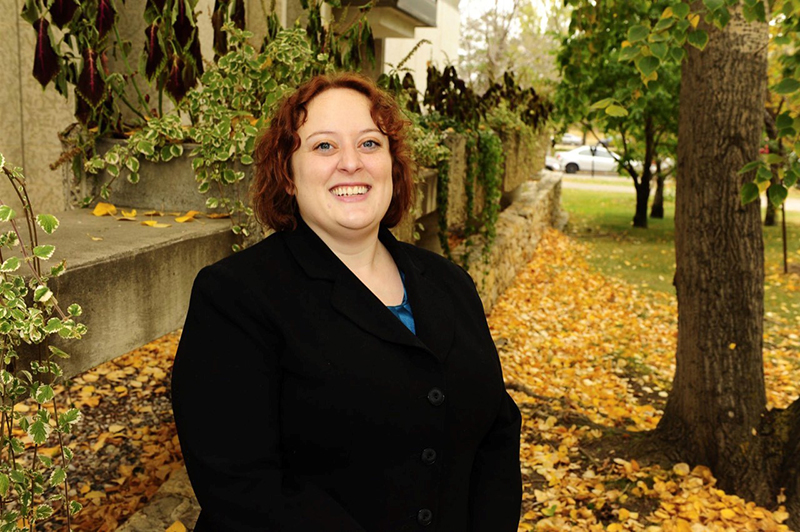
Delaware and completing her pre-doctoral residency at the Royal Ottawa Hospital. Her research interests broadly focus on the intersection of interpersonal connection and psychopathology. She has advocated for USask’s clinical psychology doctoral program to increase its coverage of Indigenous mental health and efforts at Reconciliation, resulting in increased representation of the topic at the department’s speaker series and, for the 2020-21 academic year, the first full course offering in Indigenous healing psychology. Cummings was also part of a team that developed an open textbook—books available online for free—for several sections of two first-year USask psychology classes.
Cummings describes her teaching persona as “that of an adaptive mentor.” She notes that psychological science is constantly changing so, as an instructor, she emphasizes learning how to think critically and evaluate knowledge over the memorization of facts and material. She aims to be flexible in her teaching style and is open to trying new methods. “If you visited my classroom, you might see me engaged as a lecturer, pausing to encourage my students to ask questions or share their opinions and experiences. You would be equally likely to see my students working together on a problem-based activity. You might find me working with a student one-on-one in the lab, helping them run an experiment or manage their data. Or, you might find me role-playing assessment and intervention techniques with beginning therapists,” she said.
Dr. Kyle McLeister
After receiving a Bachelor of Arts (honours) degree at the University of Toronto and a master’s degree and a PhD in Roman history from McMaster University, Dr. Kyle McLeister (PhD) joined USask’s Department of History as a sessional lecturer in 2017 to teach Medical Terminology (CLAS 103.3) and the History of Ancient
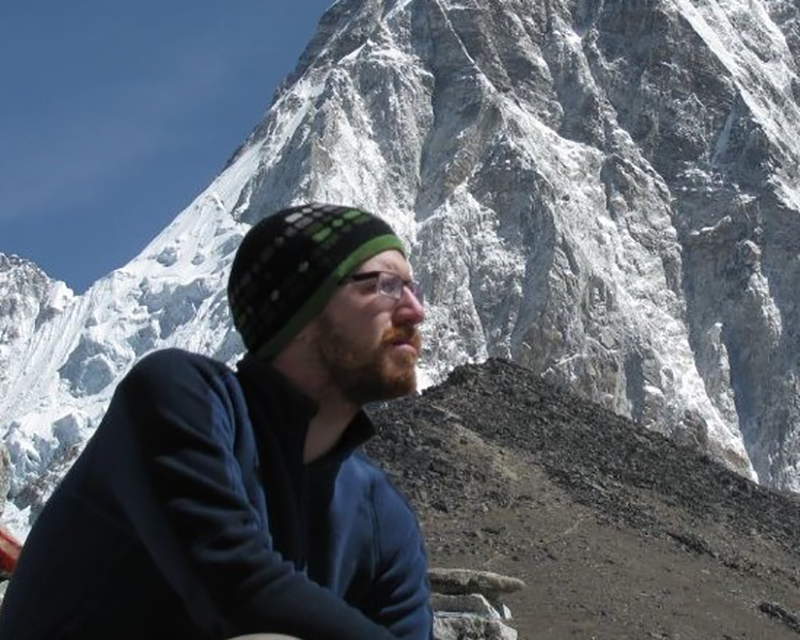
Greece (HIST 203.3). Based in part on his tremendous success with Medical Terminology, he was hired as a lecturer without term in the history department in July 2019. Over the past four years, McLeister has introduced five new classes and has established the Certificate in Medical Language. Already known as a skilled online instructor before the switch to remote learning occurred at USask in the 2020-21 academic year, his leadership during the pandemic has been described as “nothing short of a miracle” for history department faculty members and graduate student teaching assistants (TAs).
McLeister’s teaching philosophy centres around active learning, providing ongoing feedback so students can assess their progress and collaborating with colleagues to develop teaching materials. He regularly teaches both online and in-person courses and is a strong proponent of online courses “because they are a great way to reach non-traditional students,” such as those with full-time jobs or families. He emphasizes active learning in all of his classes, always devoting at least one hour of class time per week to discussion in history courses. “I did not want students taking online courses to miss out on the opportunity for active learning, so for my online first-year history course (HIST 165) I developed a system for offering online seminars—which was the first time that this had been done at the university,” he said. “During these online seminars, TAs guide the students through a discussion of the readings, with the TA using a microphone while students type their answers into the chat function. Because all of the students can participate at once, rather than going one at a time, this approach allows for more participation and greater student engagement.”
Dr. Marla Mickleborough
Dr. Marla Mickleborough (PhD) began her appointment at USask in 2015 as one of two faculty members affiliated with the new BA&Sc program in health studies (HLST), an interdisciplinary program housed in the Department of Psychology (soon to be renamed the Department of Psychology and Health Studies). She has
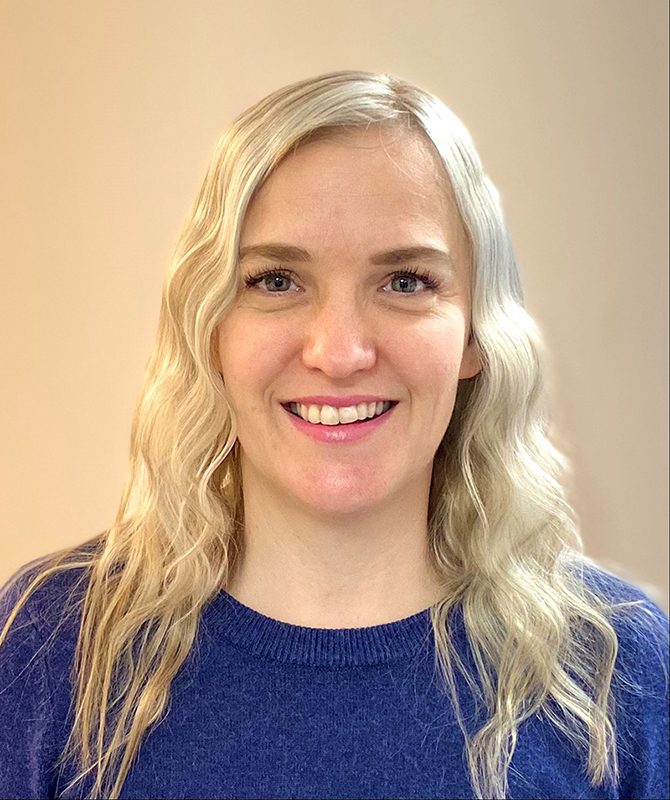
been responsible, along with her colleague Dr. Ulrich Teucher (PhD), for the development of the core HLST courses and for collaborating with other USask departments and units involved in the program. Mickleborough became a faculty member in the department after completing a master’s degree in neuroscience at the University of Western Ontario and a PhD in neuroscience at the University of British Columbia, as well as a postdoctoral fellowship within the Department of Psychology and the Department of Medical Imaging at USask. Among her research interests is a project that is exploring whether meditation can help treat migraine headaches, which she began after receiving funding from the Saskatchewan Health Research Foundation (SHRF).
Mickleborough describes herself as “a believer in life-long learning, knowledge sharing and encouraging critical thinking as a life skill.” Her favourite moments in teaching are during and after lectures when students ask questions that indicate they understood the material, are critically applying concepts from class to material they come across in daily life and are enjoying the learning experience. “As an educator, my primary objective is to facilitate the learners in absorbing as much of the material as they can,” she said. “To do this, I strive to make the material as accessible as possible by clearly explaining key concepts and linking the material to everyday experiences and real-world situations using anecdotes and video clips. In addition, I give clear objectives as to what students are expected to learn.”
Dr. Christopher Phenix
Dr. Chris Phenix (PhD) joined USask in 2016 as a tenure-track assistant professor in the Department of Chemistry, after completing a PhD in chemistry at USask and a Bachelor of Science degree, majoring in chemistry and biochemistry, at the University of Regina. He has since built a large research program at USask
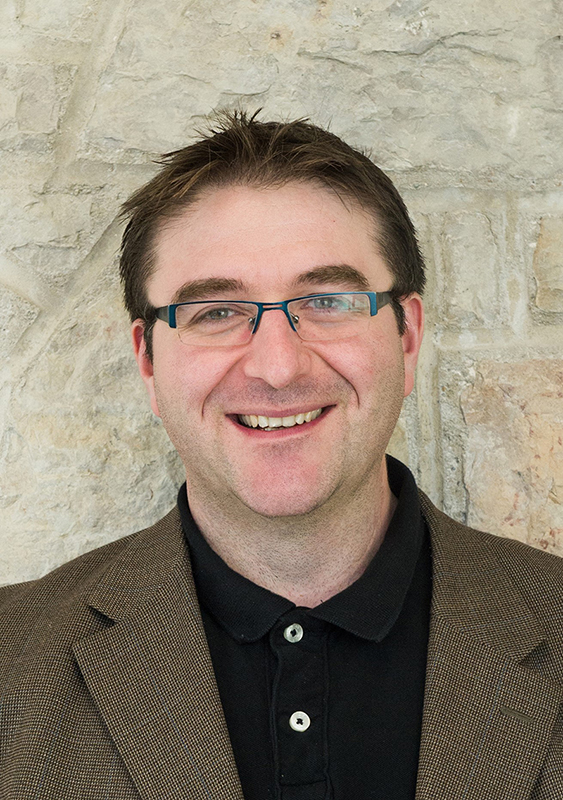
largely focused on the development of agents for imaging enzyme activity in disease-promoting processes, including cancer and Parkinson’s disease, chemical tools to aid in drug discovery and radiotracers to understand mechanisms of plant resistance to abiotic stressors. Despite the time required to write grants and supervise his team, while also working with more than 20 different collaborators, he has put significant effort into teaching undergraduate and graduate courses. A unique aspect of his journey at USask has been his efforts toward Indigenization and Reconciliation in chemical education.
Phenix has noted that many of today’s students, who were born in the mid-1990s, “are the first humans in history raised fully integrated into technology.” He believes the internet has brought about many positive benefits to facilitate learning, such as discussion forums, lectures, tutorials, open textbooks and video demonstrations—all of which can provide high-quality sources of information. Phenix also aims to create a safe, supportive and light-hearted learning environment. “The first class of the semester is entirely dedicated to addressing perceptions students may have about chemistry, providing effective strategies for student success, instilling confidence and clearly outlining what information is needed from prerequisite courses,” he said. “I love to learn and attempt to inject this enthusiasm for research and teaching on Day 1 of every course I teach. To create a non-judgmental environment for students, I often openly reflect on my own academic journey with its many ups and downs.”
Dr. Ulrich Teucher
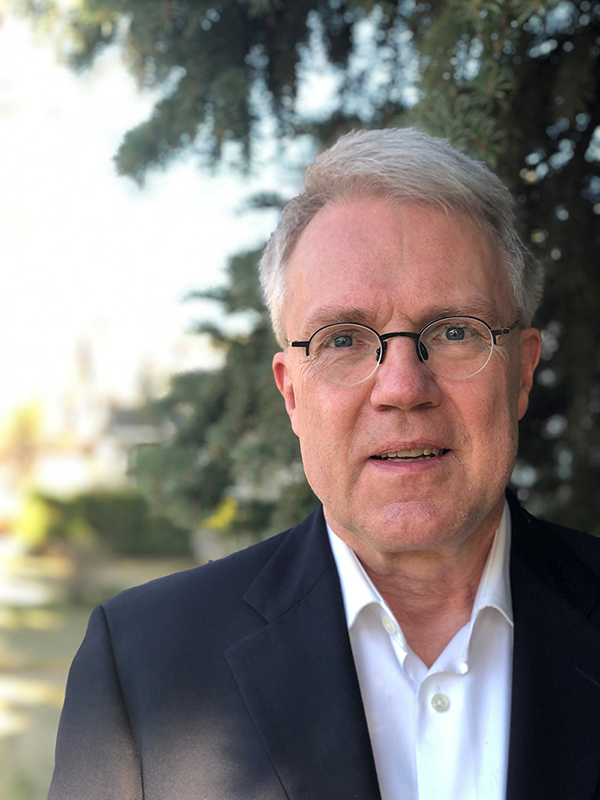
Dr. Ulrich Teucher (PhD) first worked as a pediatric nurse in oncology in Hamburg before immigrating to Canada. Pursuing interdisciplinary interests, he completed a PhD in comparative literature at the University of British Columbia (UBC), combining his nursing background and coursework in literature and psychology to write his doctoral thesis on a tri-partite “Therapeutic Psychopoetics” of metaphor use in cancer discourse. Following postdoctoral years in child-developmental research at UBC and the University of Nottingham (UK), he joined the Department of Psychology (soon to be renamed the Department of Psychology and Health Studies) at USask in the summer of 2005. Since the undergraduate health studies (HLST) program opened in 2015, he has focused on teaching the program’s four core courses. He was recently named a recipient of a 2021 Provost’s College Award and was honoured on April 30, 2021, during USask’s online Celebration of Teaching ceremony.
Teucher is known for his work in building the HLST program and for putting his students first. In the 2021-21 academic year, as most USask classes were taught remotely, he decided to focus his courses on the pandemic, keeping his course material fresh and relevant. “I find that the health studies program is unique in the possibilities that it offers for interdisciplinarity, for conveying a range of perspectives and for eliciting participation and enthusiasm in our students—and I feel blessed that I can share this excitement with my colleague, Dr. Marla Mickleborough, since we co-teach this unique program,” he said. “Our health studies students live in unprecedented times, must learn unprecedented ways to cope with the pandemic and pursue their study interests in unprecedented ways—as the health threat of the pandemic has invariably inserted itself not only into their personal but also their emerging professional lives. It has been an honour to support our students in meeting these challenges as best as we can, from as many perspectives as we can, always critically, and with an emphasis on taking action.”
